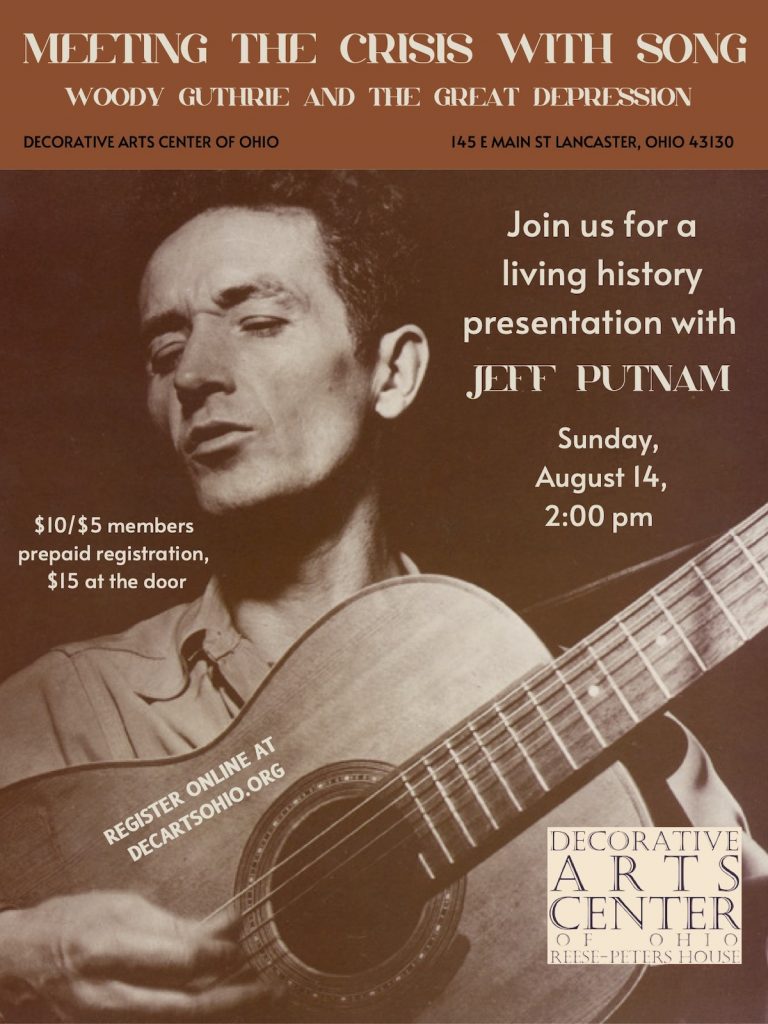Culture
Jeff Putnam brings Woody Guthrie to life for Aug. 14 event at the Decorative Arts Center of Ohio
By: Emily Votaw
Posted on:
LANCASTER, Ohio (WOUB) — Jeff Putnam will bring his Woody Guthrie living history presentation, “Meeting the Crisis With Song: Woody Guthrie and the Great Depression,” to the Decorative Arts Center of Ohio (145 E. Main St.) in Lancaster Sunday, August 14.
The presentation is a part of the Decorative Arts Center’s “Chronicles” exhibition, which showcases WPA photographs taken during the Great Depression alongside photos taken over the past two years of the Covid-19 pandemic.
Throughout his lifetime Guthrie used his music to comment on the same increasingly difficult and divided America catalogued by those WPA images — an America which simultaneously bears uncanny resemblance to the present day while remaining decidedly alien in relation to it.
Putnam said he first became aware of Guthrie the same way many people of his generation did: via Guthrie’s enormous influence on the folk music revival of the ‘60s.
“You don’t dip your toe in folk music very long before you end up stubbing it on Woody Guthrie,” Putnam said. “Guthrie’s life makes for good dramatic tension, which is important, because these living history portrayals are not just musical performances. They’re sort of acting performances where I have to sell my performance as Woody Guthrie. And it makes for interesting dramatic tension to compare the personal and the social aspects of his life.”
Putnam said Guthrie had what the musician called a “rambling itch,” a seeming inability to stay in one place with the same people too long – even if those people were his wife and children and that place was the home they had made together.
“He was complicated psychologically in that his focus was on helping other people, but he was very farsighted when it came to bettering people’s lives,” Putnam said. “He was very concerned about migrant workers all over the state of California, but he couldn’t see the damage he was doing to his own family. Maybe that’s not so unusual in social activist types, but his family really suffered for his interests in society at large.”
Putnam theorizes Guthrie’s constant running away was more complex than an unwillingness to settle down. Guthrie’s mother had suffered enormously due to a mysterious ailment we now know as Huntington’s disease, a genetic disorder which causes progressive degeneration of nerve cells in the brain.
“You don’t dip your toe in folk music very long before you end up stubbing it on Woody Guthrie. Guthrie’s life makes for good dramatic tension, which is important, because these living history portrayals are not just musical performances. They’re sort of acting performances where I have to sell my performance as Woody Guthrie. And it makes for interesting dramatic tension to compare the personal and the social aspects of his life.” – Jeff Putnam
“Woody’s mother was afflicted with serious dementia, and she experienced major physical decline – so I think that deep down, Woody knew that what happened to his mother was hereditary,” Putnam said. “He didn’t know if he had it, but by the time he got to be 35 years old, he was starting to feel what he feared were the first symptoms of Huntington’s disease.”
Guthrie’s fears were correct. The musician spent the last years of his life institutionalized, ultimately dying in 1967 at the Creedmoor Psychiatric Center in Queens Village, New York. However, by the time Guthrie died, his catalog of politically charged folk songs for the everyday person had been discovered by some of the rising voices of the ‘60s folk revival, such as Bob Dylan, Pete Seeger, and Joan Baez, all of whom acknowledged the enormous impact Guthrie’s music had on them.
“I think Joan Baez is quoted at some point at saying ‘we’re all Woody’s children,’” Putnam said. “And I think that’s the point at which he becomes much more in the public eye. People started hearing others playing his songs and started to ask ‘who’s the guy who wrote these songs?’”
Putnam points out Guthrie’s influence in everything from the working class focus of Bruce Springsteen’s discography to the focus on highlighting social evils exercised by rap and hip-hop groups such as Run the Jewels or The Coup.
“Woody used music to sort of crystallize important issues, to summarize important issues for people,” Putnam said. “He saw the Great Depression in personal terms. He didn’t write songs about government policy or other sort of mega issues like that. He saw the problems on a personal scale. And so he wrote about starving farmers and migrant workers and hobos and trains. And I think you still see this dynamic at work in popular music today.”
Catch Jeff Putnam’s “Meeting the Crisis With Song: Woody Guthrie and the Great Depression” at the Decorative Arts Center of Ohio Sunday, August 14 at 2 p.m. Tickets are $10 for prepaid registration, $5 for Decorative Arts Center members, and $15 at the door. Register at decartsohio.org.


